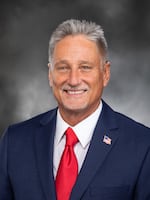
State Sen. Jeff Wilson, Republican from Longview, Wash.
Washington State / Washington State Legislature
Following in Oregon’s footsteps, a pair of bills in Washington state are hoping to make it harder for thieves to steal and sell catalytic converters.
The proposals hope to eventually stifle the market for the converters, which house precious metals that have recently become more valuable than gold.
Thefts of the exhaust cleaning component have risen across the nation. As Washington Sen. Jeff Wilson, R-Longview, points out, it’s led many drivers to discover sawed-off pipes under their vehicle with a missing piece between. Their cars are suddenly noisier — and illegal on Washington roads.
“This crime isn’t petty for people who rely on their cars to get to and from work every day,” Wilson said in an interview. The price tag for a replacement has risen, too, Wilson said.
The National Insurance Crime Bureau, a nonprofit organization that tracks car-related crimes, reports catalytic converter thefts in Washington state have skyrocketed: from 42 in 2019 to 3,379 in 2021.
Two bills, including one sponsored by Wilson, hope to address the crime. Wilson’s mimics an Oregon law passed in 2021, which mainly prohibits scrap metal businesses from purchasing converters from anyone except commercial sellers or the vehicle’s owner. It also forbids cash payments on the spot.
Another bill, sponsored by Rep. Cindy Ryu, D-Shoreline, would establish a tracking pilot project led by the Washington State Patrol and create a task force to look into the issue and report recommendations by October 2023. Both bills have held hearings.
The two bills aren’t facing the same kinds of reception, however.
At a hearing Tuesday for Wilson’s bill, law enforcement groups and players in the scrap metal industry raised concerns the bill could miss the mark.
Holly Chisa, a lobbyist representing the Institute of Scrap Recycling Industries, said Washington laws already require scrapyards to heavily document metal sales with individuals, including logging a person’s ID into a database and taking pictures of the material. Cash deals are also regulated, Chisa said.
“It is already illegal under current law for a scrapyard to purchase stolen material,” she said.
Chisa, in a point that was echoed by a representative for Schnitzer Steel, also cast doubt that scrapyards are the logical place to deter thefts. She said online marketplaces like Craigslist are hubs for illicit sales.
A statewide law enforcement organization similarly said the bill “doesn’t provide many of the answers we need.” Taylor Gardner, of the Washington Association of Sheriffs and Police Chiefs, said the group wanted legislation to better identify thieves, stop the thefts from occurring, and put in “strong consequences.”
“The language (in the bill) in our view does not really help achieve these goals,” Gardner said.
Both the scrapyard and law enforcement groups testified in support of a task force that would be established by Ryu’s bill. A task force, Chisa said in a separate hearing, would better target where stolen catalytic converters are sold.
Wilson told OPB he understood the concerns, but felt his proposed prohibitions — which include fines for violators — would curb the thefts. However, he said, he was willing to make changes.
“I’m willing to work on something that’s going to make common sense right now, to get something across the finish line to tell Washington citizens, ‘We heard you,’” Wilson said.
Both bills are headed for executive sessions in their respective chambers Thursday.